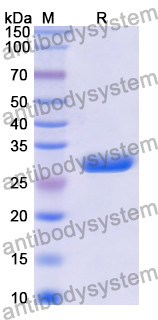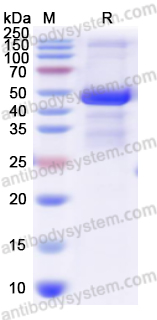Catalog No.
YHE50501
Expression system
E. coli
Species
Homo sapiens (Human)
Protein length
Ser484-Thr705
Predicted molecular weight
28.04 kDa
Nature
Recombinant
Endotoxin level
Please contact with the lab for this information.
Purity
>90% as determined by SDS-PAGE.
Accession
P46977
Applications
ELISA, Immunogen, SDS-PAGE, WB, Bioactivity testing in progress
Form
Lyophilized
Storage buffer
Lyophilized from a solution in PBS pH 7.4, 0.02% NLS, 1mM EDTA, 4% Trehalose, 1% Mannitol.
Reconstitution
Reconstitute in sterile water for a stock solution. A copy of datasheet will be provided with the products, please refer to it for details.
Shipping
In general, proteins are provided as lyophilized powder/frozen liquid. They are shipped out with dry ice/blue ice unless customers require otherwise.
Stability and Storage
Use a manual defrost freezer and avoid repeated freeze thaw cycles. Store at 2 to 8°C for frequent use. Store at -20 to -80°C for twelve months from the date of receipt.
Alternative Names
Dolichyl-diphosphooligosaccharide--protein glycosyltransferase subunit STT3A, Oligosaccharyl transferase subunit STT3A, STT3-A, 2.4.99.18, B5, Integral membrane protein 1, Transmembrane protein TMC, STT3A, ITM1, TMC
Redundancy of the OST catalytic subunit facilitates therapeutic targeting of N-glycosylation., PMID:40494352
Shared host genetic landscape of respiratory viral infection., PMID:40372436
The oligosaccharyltransferase subunit PsSTT3A regulates N-glycosylation and is critical for development and virulence of Phytophthora sojae., PMID:40059268
STT3B promotes porcine epidemic diarrhea virus replication by regulating N-glycosylation of PEDV S protein., PMID:39945486
Heterozygous pathogenic STT3A variation leads to dominant congenital glycosylation disorders and functional validation in zebrafish., PMID:39891251
A STT3A-dependent PD-L1 glycosylation modification mediated by GMPS drives tumor immune evasion in hepatocellular carcinoma., PMID:39690246
OST Catalytic Subunit Redundancy Enables Therapeutic Targeting of N-Glycosylation., PMID:39677793
STT3-mediated aberrant N-glycosylation of CD24 inhibits paclitaxel sensitivity in triple-negative breast cancer., PMID:39668180
Suppression of Dad1 induces cardiomyocyte death by weakening cell adhesion., PMID:39611549
Processing of N-glycans in the ER and Golgi influences the production of surface sialylated glycoRNA., PMID:39531110
Regulated N-glycosylation controls chaperone function and receptor trafficking., PMID:39509507
Discovery of Potent STT3A/B Inhibitors and Assessment of Their Multipathogen Antiviral Potential and Safety., PMID:39136957
Acceptors stability modulates the efficiency of post-translational protein N-glycosylation., PMID:38934375
Positive selection CRISPR screens reveal a druggable pocket in an oligosaccharyltransferase required for inflammatory signaling to NF-κB., PMID:38670073
Pharmacological suppression of HHLA2 glycosylation restores anti-tumor immunity in colorectal cancer., PMID:38522775
MIIP downregulation drives colorectal cancer progression through inducing peri-cancerous adipose tissue browning., PMID:38245780
Landscape of protein-protein interactions during hepatitis C virus assembly and release., PMID:38230952
Delta-tocotrienol disrupts PD-L1 glycosylation and reverses PD-L1-mediated immune suppression., PMID:38159375
STT3A-mediated viral N-glycosylation underlies the tumor selectivity of oncolytic virus M1., PMID:37864032
Cell-free N-glycosylation of peptides using synthetic lipid-linked hybrid and complex N-glycans., PMID:37767159
Yi-shen-hua-shi granules modulate immune and inflammatory damage via the ALG3/PPARγ/NF-κB pathway in the treatment of immunoglobulin a nephropathy., PMID:37757993
FAT4 overexpression promotes antitumor immunity by regulating the β-catenin/STT3/PD-L1 axis in cervical cancer., PMID:37658376
Coagulation factor VIIa enhances programmed death-ligand 1 expression and its stability in breast cancer cells to promote breast cancer immune evasion., PMID:37579880
Deglycosylation of SLAMF7 in breast cancers enhances phagocytosis., PMID:36381324
Promoting anti-tumor immunity by targeting TMUB1 to modulate PD-L1 polyubiquitination and glycosylation., PMID:36376293
Elevation of spermine remodels immunosuppressive microenvironment through driving the modification of PD-L1 in hepatocellular carcinoma., PMID:36348350
Proteome and Glycoproteome Analyses Reveal the Protein N-Linked Glycosylation Specificity of STT3A and STT3B., PMID:36139350
Targeting STT3A produces an anti-tumor effect in lung adenocarcinoma by blocking the MAPK and PI3K/AKT signaling pathway., PMID:35832442
Upregulation of ribosome complexes at the blood-brain barrier in Alzheimer's disease patients., PMID:35766008
Analysis of Tumor Glycosylation Characteristics and Implications for Immune Checkpoint Inhibitor's Efficacy for Breast Cancer., PMID:35444644
TGF-β1-Mediated PD-L1 Glycosylation Contributes to Immune Escape via c-Jun/STT3A Pathway in Nasopharyngeal Carcinoma., PMID:35311117
Targeting conserved N-glycosylation blocks SARS-CoV-2 variant infection in vitro., PMID:34839261
The N-glycosylation-related genes as potential targets for RNAi-mediated pest control of the Colorado potato beetle (Leptinotarsa decemlineata)., PMID:34821017
Knockdown of Oligosaccharyltransferase Subunit Ribophorin 1 Induces Endoplasmic-Reticulum-Stress-Dependent Cell Apoptosis in Breast Cancer., PMID:34778038
A cytosolic reductase pathway is required for efficient N-glycosylation of an STT3B-dependent acceptor site., PMID:34734627
Active site variants in STT3A cause a dominant type I congenital disorder of glycosylation with neuromusculoskeletal findings., PMID:34653363
Mettl14-Mediated m6A Modification Facilitates Liver Regeneration by Maintaining Endoplasmic Reticulum Homeostasis., PMID:33848642
Glycometabolic Regulation of the Biogenesis of Small Extracellular Vesicles., PMID:33053347
Chitosan oligosaccharide induces resistance to Pst DC3000 in Arabidopsis via a non-canonical N-glycosylation regulation pattern., PMID:33049851
The AT1 receptor autoantibody causes hypoglycemia in fetal rats via promoting the STT3A-GLUT1-glucose uptake axis in liver., PMID:32871226
Inflammatory conditions promote a switch of oligosaccharyltransferase (OST) catalytic subunit isoform expression., PMID:32810478
Synthesis of lipid-linked oligosaccharides by a compartmentalized multi-enzyme cascade for the in vitro N-glycosylation of peptides., PMID:32653637
N-glycosylation is involved in stomatal development by modulating the release of active abscisic acid and auxin in Arabidopsis., PMID:32649744
Identification and validation of m6A RNA methylation regulators with clinical prognostic value in Papillary thyroid cancer., PMID:32514248
N-Glycosylation Regulates Chitinase 3-like-1 and IL-13 Ligand Binding to IL-13 Receptor α2., PMID:32402213
Structural Insight into the Mechanism of N-Linked Glycosylation by Oligosaccharyltransferase., PMID:32316603
Comparative and evolutionary analyses of the divergence of plant oligosaccharyltransferase STT3 isoforms., PMID:32011067
Intramembrane protease RHBDL4 cleaves oligosaccharyltransferase subunits to target them for ER-associated degradation., PMID:32005703
Cryo-electron microscopy structures of human oligosaccharyltransferase complexes OST-A and OST-B., PMID:31831667
RETRACTED: KYA1797K down-regulates PD-L1 in colon cancer stem cells to block immune evasion by suppressing the β-catenin/STT3 signaling pathway., PMID:31812723



